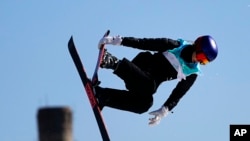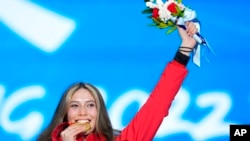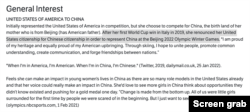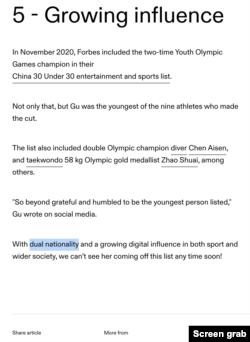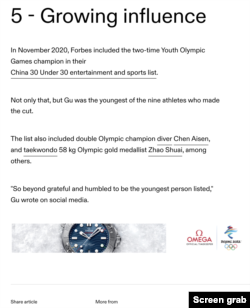The mystery surrounding the citizenship of U.S.-born Chinese Olympic team star Eileen Gu has deepened, with VOA learning that two Olympic websites scrubbed contradictory information about her status shortly after she won her first gold medal of the Beijing Winter Games.
The 18-year-old freestyle skier fueled speculation about her status during a post-victory news conference Tuesday when she declined to respond directly to several reporters’ questions about whether she remains a U.S. citizen. She had just won gold in the women’s freeski big air event.
The San Francisco native, who was born a U.S. citizen to a Chinese immigrant mother and an American father, switched her sporting allegiance from the U.S. to China in 2019, making the announcement on Instagram But the manner in which she made the switch has remained unclear.
Under Rule 41 of the Olympic Charter, Gu must be a Chinese national in order to compete for China. But for a person to successfully naturalize as a Chinese citizen, Article 8 of China’s Nationality Law says that person “shall not retain foreign nationality.”
U.S. authorities have not commented on whether Gu has renounced her U.S. citizenship, a decision they typically treat as a private matter.
In recent days, the lack of clarity about Gu’s loyalties has been a hot topic for social media users in the U.S. and China, two global powers navigating an increasingly tense relationship.
Many of those commentators did not appear to have noticed that the website of the Beijing Organizing Committee of the Winter Games, Beijing2022.cn, had an English-language profile page for Gu with a biographical section containing the following sentence: “After her first World Cup win in Italy in 2019, she renounced her United States citizenship for Chinese citizenship in order to represent China at the Beijing 2022 Olympic Winter Games.” British news site Independent first reported that information about her profile page on February 2.
The reference to Gu renouncing her U.S. citizenship remained on her profile page when VOA reviewed it on Wednesday, indicating that it had been online for at least a week.
When VOA reviewed the same page on Thursday, the sentence had been rewritten to say: “After her first World Cup win in Italy in 2019, she made the decision to compete for China.”
Also removed from the updated version of her profile was a quote that she gave to her Austrian sponsor Red Bull in December and that she has since repeated in various forms, including at Tuesday’s news conference: “When I’m in America, I’m American. When I’m in China, I’m Chinese."
The Mandarin version of Gu’s profile on the Beijing Organizing Committee’s website contains only her basic personal, event and schedule information without any of the lengthy background details of the English version.
Also apparently overlooked by many social media users was a contradictory piece of information about Gu’s citizenship that had been on the International Olympic Committee’s website, Olympics.com, in the opening days of the Beijing Games.
In a report published Wednesday, the Taiwan News site noted that an Olympics.com article titled “Five things you didn't know about Eileen Gu” ended with a sentence referring to Gu as having “dual nationality.”
That sentence disappeared from the article on Thursday, according to a cached view of it from that date as seen by VOA. An earlier cached view of the article reviewed by VOA shows that the sentence was visible online going back to at least February 5.
VOA emailed the Beijing Organizing Committee and the International Olympic Committee early Friday asking why the details about Gu’s citizenship were scrubbed from their respective websites sometime Wednesday or Thursday.
The Beijing Organizing Committee responded Saturday by advising VOA to contact the Chinese Olympic Committee, which did not immediately respond to a request for comment.
The IOC emailed VOA late Friday with a statement that did not address the issue of the words “dual nationality” being quietly removed from its article about Gu.
Instead, the IOC statement said Gu “acquired” Chinese nationality in 2019 and the IOC executive board approved her “change of sporting nationality” in December of that year after the Chinese Olympic Committee submitted the necessary documentation, including a “copy of her Chinese passport.” It also referred further questions about Gu to the Chinese Olympic Committee.
VOA also messaged Gu on Instagram and emailed the management companies evolution management + marketing and IMG, which represent her sporting and fashion activities respectively for comment, without response.
Susan Brownell, an American research specialist on Chinese sports and an anthropology professor at the University of Missouri-St. Louis, told VOA that she does not believe that either of the scrubbed statements about Gu, regarding renouncing her U.S. citizenship and having dual nationality, is more definitive than the other.
Speaking in a Friday interview, Brownell also said she believes there are two main reasons for the silence on citizenship questions from China’s Olympic organizers, Gu and many of the other 29 foreign-born and foreign-raised athletes on the Chinese Winter Games team.
China has never before fielded so many foreign-born or foreign-raised athletes on an Olympic team for either the Summer or Winter Games. It recruited the 30 athletes with foreign ties to its current Olympic team, 28 of them ice hockey players, to try to improve its relatively weak performance in winter sports as it hosts the Winter Games for the first time.
“After the Beijing Games, they're going to assess public opinion about having those athletes in the team: Was it good for Chinese sports, patriotism and the government’s image, or was there a negative nationalist backlash?” Brownell said. “It’s a politically sensitive matter that they would want to keep a lid on at this point,” she added.
Brownell said China also is wary of publicly declaring that it may have granted Gu or any of the other foreign-born and foreign-raised athletes rare exceptions to its nationality law to enable them to naturalize as Chinese citizens without giving up their dual nationalities.
“You've got hundreds of thousands of people in China that really want dual citizenship. If you give it to athletes, the other people immediately are going to start saying, ‘What about me?’ I think that's why you have the silence,” she said.
Lin Yang and Adrianna Zhang of VOA’s Mandarin service contributed to this story.




